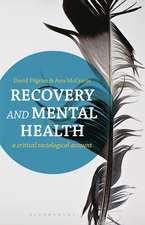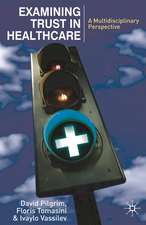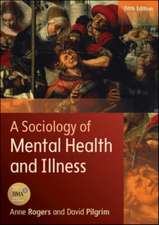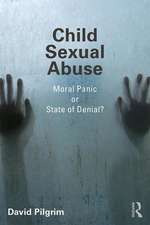Understanding Mental Health: A critical realist exploration: Ontological Explorations (Routledge Critical Realism)
Autor David Pilgrimen Limba Engleză Hardback – 9 sep 2014
| Toate formatele și edițiile | Preț | Express |
|---|---|---|
| Paperback (1) | 379.88 lei 6-8 săpt. | |
| Taylor & Francis – 4 aug 2016 | 379.88 lei 6-8 săpt. | |
| Hardback (1) | 1058.43 lei 6-8 săpt. | |
| Taylor & Francis – 9 sep 2014 | 1058.43 lei 6-8 săpt. |
Din seria Ontological Explorations (Routledge Critical Realism)
- 8%
 Preț: 425.29 lei
Preț: 425.29 lei -
 Preț: 340.38 lei
Preț: 340.38 lei -
 Preț: 326.49 lei
Preț: 326.49 lei -
 Preț: 295.64 lei
Preț: 295.64 lei -
 Preț: 379.07 lei
Preț: 379.07 lei - 28%
 Preț: 821.10 lei
Preț: 821.10 lei - 26%
 Preț: 817.51 lei
Preț: 817.51 lei -
 Preț: 488.33 lei
Preț: 488.33 lei -
 Preț: 461.86 lei
Preț: 461.86 lei -
 Preț: 480.83 lei
Preț: 480.83 lei - 30%
 Preț: 937.61 lei
Preț: 937.61 lei -
 Preț: 438.14 lei
Preț: 438.14 lei - 17%
 Preț: 270.20 lei
Preț: 270.20 lei -
 Preț: 413.33 lei
Preț: 413.33 lei - 18%
 Preț: 1117.07 lei
Preț: 1117.07 lei -
 Preț: 464.54 lei
Preț: 464.54 lei -
 Preț: 365.91 lei
Preț: 365.91 lei -
 Preț: 145.32 lei
Preț: 145.32 lei - 18%
 Preț: 1058.69 lei
Preț: 1058.69 lei - 43%
 Preț: 213.77 lei
Preț: 213.77 lei - 43%
 Preț: 189.44 lei
Preț: 189.44 lei - 23%
 Preț: 339.31 lei
Preț: 339.31 lei -
 Preț: 446.53 lei
Preț: 446.53 lei - 15%
 Preț: 425.26 lei
Preț: 425.26 lei -
 Preț: 413.76 lei
Preț: 413.76 lei - 18%
 Preț: 1225.29 lei
Preț: 1225.29 lei - 29%
 Preț: 273.65 lei
Preț: 273.65 lei - 18%
 Preț: 1054.89 lei
Preț: 1054.89 lei - 28%
 Preț: 819.32 lei
Preț: 819.32 lei -
 Preț: 480.24 lei
Preț: 480.24 lei - 18%
 Preț: 1108.73 lei
Preț: 1108.73 lei - 25%
 Preț: 823.08 lei
Preț: 823.08 lei - 25%
 Preț: 854.14 lei
Preț: 854.14 lei - 31%
 Preț: 331.35 lei
Preț: 331.35 lei
Preț: 1058.43 lei
Preț vechi: 1290.78 lei
-18% Nou
Puncte Express: 1588
Preț estimativ în valută:
202.56€ • 210.69$ • 167.22£
202.56€ • 210.69$ • 167.22£
Carte tipărită la comandă
Livrare economică 14-28 aprilie
Preluare comenzi: 021 569.72.76
Specificații
ISBN-13: 9780415824132
ISBN-10: 0415824133
Pagini: 184
Ilustrații: 2 Line drawings, black and white; 3 Tables, black and white; 2 Illustrations, black and white
Dimensiuni: 156 x 234 x 13 mm
Greutate: 0.56 kg
Ediția:1
Editura: Taylor & Francis
Colecția Routledge
Seria Ontological Explorations (Routledge Critical Realism)
Locul publicării:Oxford, United Kingdom
ISBN-10: 0415824133
Pagini: 184
Ilustrații: 2 Line drawings, black and white; 3 Tables, black and white; 2 Illustrations, black and white
Dimensiuni: 156 x 234 x 13 mm
Greutate: 0.56 kg
Ediția:1
Editura: Taylor & Francis
Colecția Routledge
Seria Ontological Explorations (Routledge Critical Realism)
Locul publicării:Oxford, United Kingdom
Cuprins
1. Psychiatric crises and the crisis of psychiatry 2. Misery in context 3. Madness in context 4. Incorrigible egocentricity in context 5. People, pharmaceuticals and politicians 6. Wellbeing 7. Overview and implications
Descriere
Understanding Mental Health: a critical realist perspective steers a middle way between psychiatric positivism and the nihilism of the recent French poststructuralist tradition. It relies on the guidance of neither psychiatry nor social science (with the discipline of psychology being an ambivalent participant in both camps), though all of this range of disciplinary knowledge provides my subject matter. Instead, the guidance comes from philosophy, one of Foucault’s three legs on the milking stool of human science, but from one of his critics, Roy Bhaskar. He and others in his wake have offered us an escape route from the cul-de-sac options of naive realism and unending postmodern scepticism.










